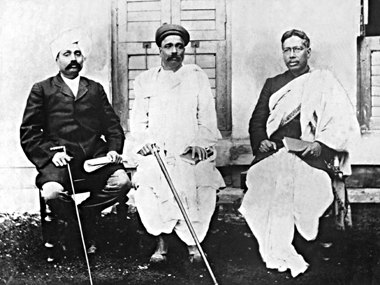
Tilak founded the Marathi daily Kesari (Lion) in 1880. In just two years 'Kesari' attracted more readers than any language news papers in India.The editorials gave a vivid picture of the people's sufferings and of actual happenings. They called upon every Indian to fight for his right. This was the objective that motivated Tilak and in what was reflected allegorically in the motto chosen by Tilak for the Kesari.
Picture 1: The Lal,Bal,Pal trio. These three were the extremist revolutionaries in the freedom struggle.
Picture2: Tilak with other leaders in a meeting

In 1908, there were few leaders (Hindu, Muslim or Sikh) of comparable stature in the Indian freedom movement, and in several ways, Tilak's ideas remain far ahead of Gandhi's. Any lover of Indian freedom and progress would have to be cognizant of that. Tilak's writings on non-violence are especially revealing of an advanced intellect. Tilak was neither a gun-fetishist nor an idealist rejecter of violence. In 1908, he saw non-violent resistance through mass civil disobedience as the preferred method of struggle only because he did not see the possibilities of winning an armed struggle against the British at that particular time. But neither did he reject the possibility that a time may come when the Indian masses would be able, ready and prepared for an armed struggle, if no other option of defeating the British seemed likely to succeed. For that reason, he was never prepared to condemn the armed revolutionaries, and defended each one as a legitimate fighter and martyr in the cause of Indian independence.
